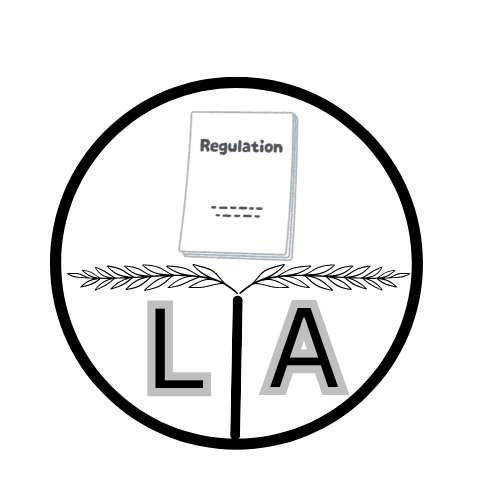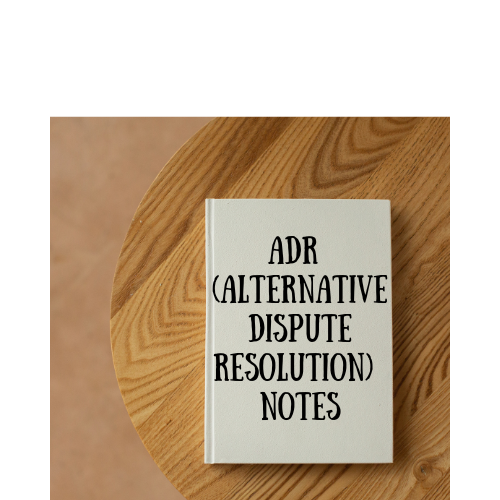ADR meaning needs types and advantages pdf
Legal Maxims : https://lawadhoctutorials.com/legal-maxims/
ADR meaning needs types and advantages pdf
Legal Terms : https://lawadhoctutorials.com/legal-maxim
All subjects law notes : https://lawadhoctutorials.com/subject/
All subjects law notes in pdf : https://lawadhoctutorials.com/notespdf/
Law of torts lecture link on YouTube: https://youtu.be/fRx-i5fk3jo?si=QPnyduoa3IeZoI5W
Visit : https://lawbhoomi.com/ for law notes.
ADR (Alternative Dispute Resolution) notes pdf – Free Download ADR (Alternative Dispute Resolution) notes
Free download Pdf of ADR (Alternative Dispute Resolution) notes meaning needs types and advantages of ADR.
These notes are in easy language and easy to remember.
Welcome to Law Adhoc Tutorials !
Law Adhoc Tutorials is an education platform. It helps law students get high quality notes to make their study easier. Law Adhoc Tutorials provides full and completes notes for free for each subjects of law.
ADR meaning needs types and advantages Notes Download
ADR meaning needs types and advantages pdf
Click here – Alternative dispute resolution
ADR (Alternative Dispute Resolution) notes
Alternative Dispute Resolution (ADR)
ADR meaning needs types and advantages pdf
Introduction
Alternative dispute resolution (ADR) offers to settle disputes outside of the courtroom with the help of an impartial third party. Outcomes may be non-binding and advisory in nature or enforceable without the right to appeal. ADR is not advised in situations of criminal law or situations where one party has excessive power over the other party.
Meaning
Alternative dispute resolution (ADR) helps settle disputes without going to court. An unbiased third party assists in the process. ADR usually occurs after the client and the insurer have tried to resolve their differences directly but can’t reach an agreement.
Alternative dispute resolution (“ADR”) refers to any method of resolving disputes without litigation. ADR regroups all processes and techniques of conflict resolution that occur outside of any governmental authority. The most famous ADR methods are the following: mediation, arbitration, conciliation, negotiation, and transaction.
Process
When both parties in a dispute agree to use alternative dispute resolution (ADR), the ADR process begins. This agreement can come from a court order, a clause in a contract, or it may be voluntary. The parties choose the best ADR method for their situation, often with the help of a lawyer. The different methods are explained in the next section.
Negotiations begin the next stage of the ADR process by setting up the procedure’s structure and rules. This includes making confidentiality agreements, outlining the schedule and expectations, and defining the roles and responsibilities of each party. At this stage, the parties can also share relevant information, documents, and evidence.
During the last part of the ADR process, the parties discuss a settlement for the conflict. If they agree on a settlement, they will create a written agreement that details their arrangement. Then, the parties need to follow through on the agreement and fulfill their commitments, such as making a settlement payment if they are found liable.
Types of Alternative Dispute Resolution
Mediation
Mediation involves a neutral third party who helps the insured and insurer communicate to find a solution that works for both. The mediator guides the conversation but does not decide who is right, allowing the parties to reach an agreement together.
Arbitration
Arbitration occurs when a neutral independent party called an arbitrator listens to arguments from both sides, collects evidence, and then decides on the outcome of the dispute, similar to a court ruling. Arbitration can either be non-binding or binding.
Negotiation
Negotiation occurs when there is direct contact between the parties to a dispute. In order to arrive at a solution that is acceptable to both parties, it enables the parties to debate their views, interests, and prospective solutions. The parties may choose to negotiate informally amongst themselves or with the aid of lawyers or other representatives.
Conciliation
Conciliation means the attempted resolution of issues raised by a complaint, or by the investigation of a complaint, through informal negotiations involving the aggrieved person, the respondent, and the Assistant Secretary.
Need for ADR:
The system of dispensing justice in India has come under great stress mainly because of the huge pendency of cases in courts.
In India, the number of cases filed in the courts has shown a tremendous increase in recent years resulting in pendency and delays underlining the need for ADR methods.
Advantages of ADRs
The resolution of disputes usually takes place privately, which helps maintain confidentiality.
It is more viable, economical, and efficient.
Procedural flexibility saves valuable time and money and the absence of stress from a conventional trial.
This often results in creative solutions, sustainable outcomes, greater satisfaction, and improved relationships.
The possibility of ensuring that specialized expertise is available on the tribunal in the person of the arbitrator, mediator, conciliator, or neutral adviser.
Further, it offers greater direct control over the outcome.
Disadvantages of ADR
Decisions made in ADR do not set a legal precedent
In some forms of ADR, such as binding arbitration, the opportunities for appealing the decision are limited.
While court judgments are enforceable by law, enforcing the outcome of an ADR process can sometimes be more challenging.
Lack of Legal Representation
Since ADR processes are less formal and more flexible, there can be inconsistency in how disputes are resolved.
In Renusagar Power Co Ltd vs. General Electric, AIR 1985 SC 1156
the Supreme Court said that the object of this legislation was to facilitate and promote international trade by providing for speedy settlement of disputes arising in trade through arbitration. It was stated that ordinarily, as a rule, an arbitrator had no authority to clothes himself with power to decide the question of his own jurisdiction unless parties expressly conferred such a power on him.
‘
Further the Court held that the question as to the validity of the contract was also for the court to decide under Section 33 and not for the arbitrator. If there was no arbitration clause at the time of entry of the arbitrators on their duties, the whole proceedings would be without jurisdiction.
ADR meaning needs types and advantages pdf



uyhdxlfvdujggfnvvtgnmxujwpvfdy